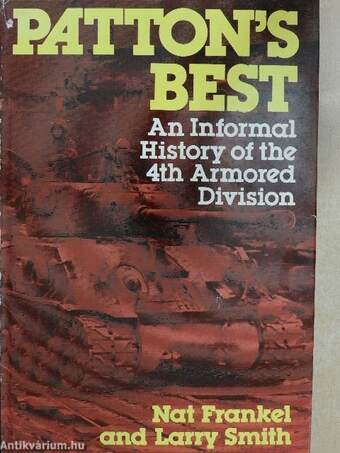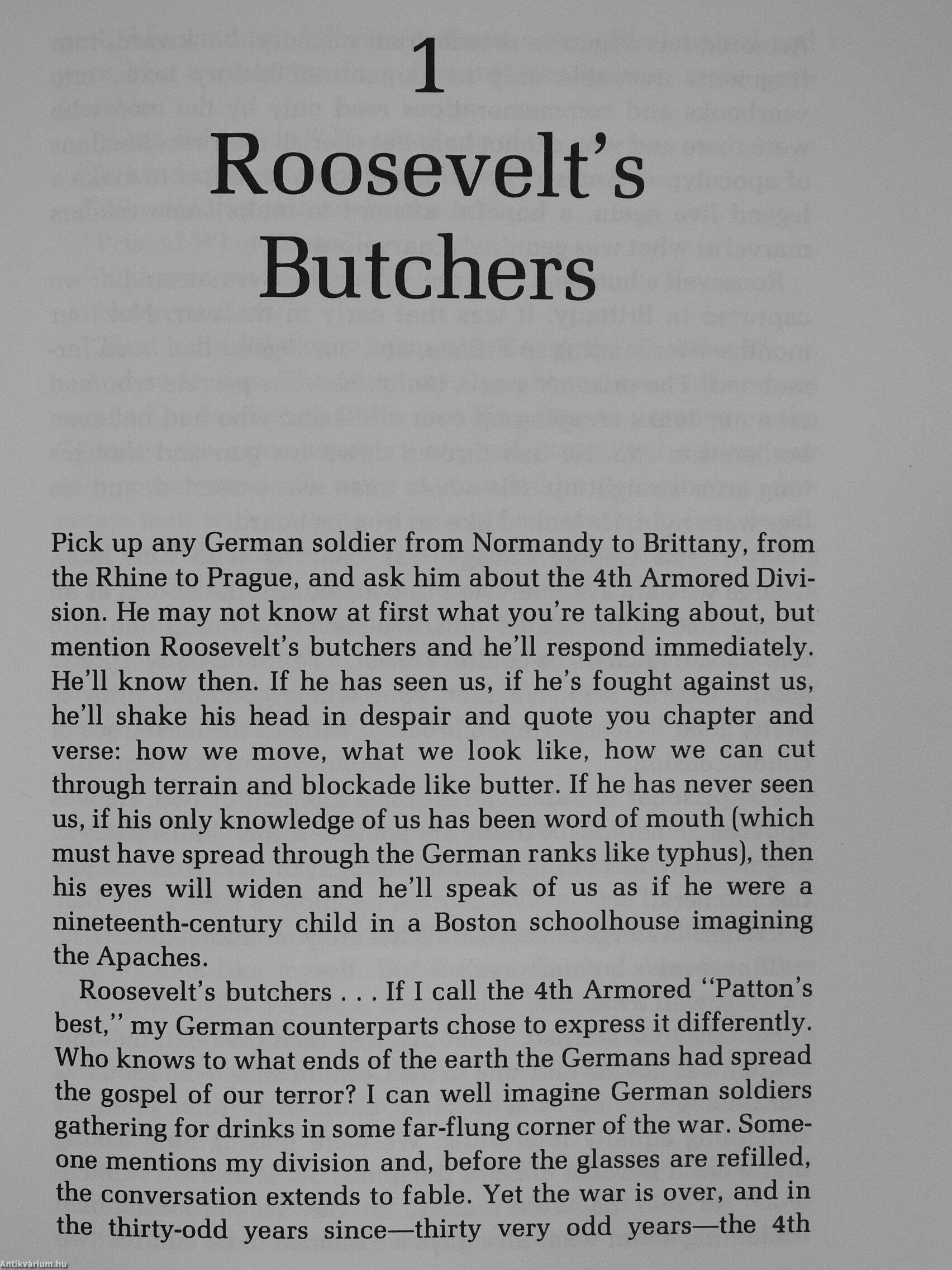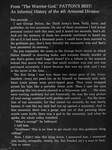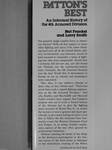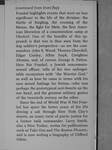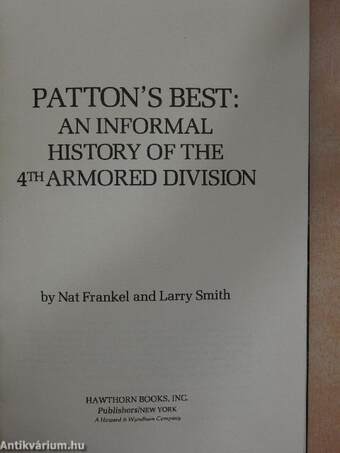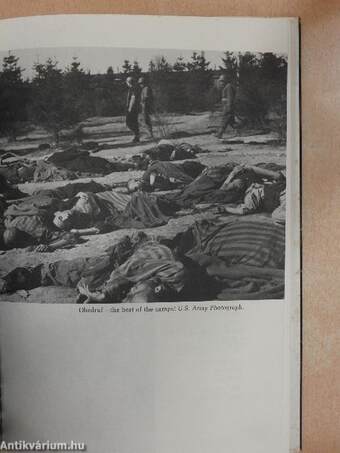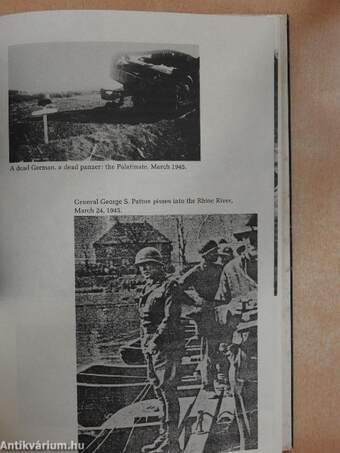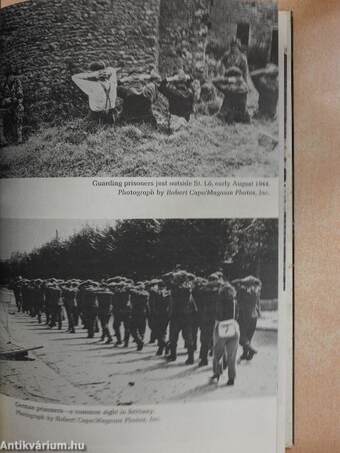1.066.455
kiadvánnyal nyújtjuk Magyarország legnagyobb antikvár könyv-kínálatát

VISSZA
A TETEJÉRE
JAVASLATOKÉszre-
vételek
Patton's Best
An Informal History of the 4th Armored Division/A 4. páncéloshadosztály informális története
| Kiadó: | Hawthorn Books, Inc. |
|---|---|
| Kiadás helye: | New York |
| Kiadás éve: | |
| Kötés típusa: | Fűzött kemény papírkötés |
| Oldalszám: | 198 oldal |
| Sorozatcím: | |
| Kötetszám: | |
| Nyelv: | Angol |
| Méret: | 24 cm x 16 cm |
| ISBN: | 0-8015-5797-6 |
| Megjegyzés: | Fekete-fehér fotókkal illusztrálva. |
naponta értesítjük a beérkező friss
kiadványokról
naponta értesítjük a beérkező friss
kiadványokról
Előszó
TovábbFülszöveg
From 'The Warrior God," PATTON'S BEST: An Informal History of the 4th Armored Division
Ten second^'. . .
I saw George Patton, the Third Army's boss, bully, lover, and godfather, on two occasions. On one of those occasions I had actual personal contact with this man, and it lasted ten seconds, that's all. And yet the memory of those ten seconds continues to haunt my life as if it had been a thousand years. I could have been married to the goddamn guy, that's how forceful the encounter was and that's how persistent its memory.
Do you remember the scene in the George Scott movie in which Patton himself is directing tanks, and screams bloody murder at one that's gotten itself bogged down? It's a tribute to the research behind that movie that even that small incident was real and was portrayed accurately. I know because that was my tank, and I was in the turret at the time. . . .
The first thing I saw was those two damn guns of his. Ivory-handled—ivory not pearl, for, as he himself... Tovább
Fülszöveg
From 'The Warrior God," PATTON'S BEST: An Informal History of the 4th Armored Division
Ten second^'. . .
I saw George Patton, the Third Army's boss, bully, lover, and godfather, on two occasions. On one of those occasions I had actual personal contact with this man, and it lasted ten seconds, that's all. And yet the memory of those ten seconds continues to haunt my life as if it had been a thousand years. I could have been married to the goddamn guy, that's how forceful the encounter was and that's how persistent its memory.
Do you remember the scene in the George Scott movie in which Patton himself is directing tanks, and screams bloody murder at one that's gotten itself bogged down? It's a tribute to the research behind that movie that even that small incident was real and was portrayed accurately. I know because that was my tank, and I was in the turret at the time. . . .
The first thing I saw was those two damn guns of his. Ivory-handled—ivory not pearl, for, as he himself so famously said, only Saint Louis pimps wear pearl-tipped guns. They were strapped across his hips like a portable totem pole. Then I saw his eyes glowering like two jewels planted in a Polynesian idol. . . . His arms were waving, randomly but not frantically. He was the very picture of total energy combined with godlike self-control. . . . For the duration of our encounter, for that unreal ten seconds, he was barely human. It was like my tank had run up against a mountain. And in that mountain there was a gorge, and out of that yawning abyss words came forth; there was a god in the mountain, and when he spoke, the whole valley trembled.
"What's wrong?" he bellowed.
I told him.
"Goddamn! This is no time to get stuck! Get this goddamn thing rolling!"
Now, I didn't take this lying down. I answered him. I answered him loudly, intrepidly, clearly. No. Nat Frankel isn't a man to hesi-""tate or cower.
B4TTON^ BEST
An Iniormal History oi the 4th Aimored Division
Nat Frankel and Larry Smith
The greatest single combat force in American history? With all due respect to every other fighting unit since 1776, when thinking back over all of the United States military involvements, any historian would be hard pressed to remember a body of fighting men who were comparable. World War I certainly did not see any, nor did Korea nor Vietnam nor the nineteenth-century wars. Certainly, the 4th Armored Division was the best World War II detachment in Europe as far as celerity and persistence were concerned.
This, then, is one soldier's attempt to show why, in fact, Patton said: "There has never been such a superb fighting organization as the 4th Armored Division." And why Bradley and MacAuliffe and Maxwell Taylor woudn't have argued. Nat Frankel's purpose was not to write a formal history of the division but to give the fighting man's account of World War II—to render the texture of war in general and more specifically to give some feeling of what it was like to follow the 4th Armored from Normandy across the Western European Front into Prague. In so doing, Frankel emphasizes aspects of the war often ignored by professional historians.
Without omitting the Battle of the Bulge or the division's participation in the famous rescue of the First Army at Bastogne or the momentous crossing of the Rhine,
(continued on back /lap)
[continued from front flap) Frankel highlights events that were no less significant to the life of the division: the Battle of Singling, the crossing of the Meuse, the fight for Metz, the first American liberation of a concentration camp at Ohrdruf. One of the benefits of this approach is that war is thus seen from the dog soldier's perspective—as are the commanders: John S. Wood, Thomas Churchill, Edgar Conley, Albin Irzyk, Creighton Abrams, and, of course, George S. Patton. Here Nat Frankel, a Jewish noncommissioned officer, tells of his two unforgettable encounters with "the Warrior God," as well as how he came to terms with his own mixed feelings for Patton—who was perhaps the prototypical anti-Semite on the one hand, and the greatest military genius of the twentieth century on the other.
Since the end of World War II Nat Frankel has spent the better years of his life driving a cab through New York City's streets, an ironic twist of poetic justice for a former tank commander. Larry Smith, also a New Yorker, writes for publications such as Take One and The Boston Phoenix, .^ and is now writing a biography of Clifford Odets.
Vissza
Témakörök
- Idegennyelv > Idegennyelvű könyvek > Angol > Szépirodalom > Regény, novella, elbeszélés
- Szépirodalom > Regény, novella, elbeszélés > Az író származása szerint > Amerika > Amerikai Egyesült Államok
- Szépirodalom > Regény, novella, elbeszélés > Tartalom szerint > Történelmi regények > Legújabb kor > II. világháború
- Szépirodalom > Regény, novella, elbeszélés > Tartalom szerint > Életrajzi regények > Önéletrajzok, naplók, memoárok
- Szépirodalom > Regény, novella, elbeszélés > Tartalom szerint > Háborús történetek
- Szépirodalom > Regény, novella, elbeszélés > Tartalom szerint > Katonák, határőrök
Megvásárolható példányok
Nincs megvásárolható példány
A könyv összes megrendelhető példánya elfogyott. Ha kívánja, előjegyezheti a könyvet, és amint a könyv egy újabb példánya elérhető lesz, értesítjük.



